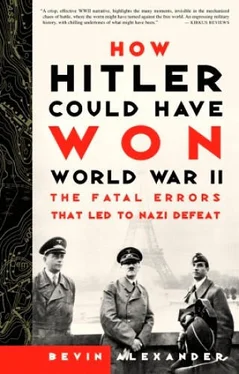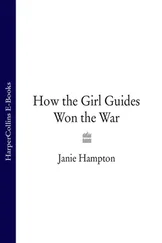A Mediterranean strategy had the advantage of striking where the Germans were weak. No one had much concern for the Italians, whose weapons were so poor and desire for war so uncertain that they were likely to surrender at the first opportunity. On the other hand, a campaign up the boot of Italy would be extremely difficult, given the mountainous nature of the terrain, while an invasion of the Balkans would be far from the vitals of Germany, in a region laced with mountains and cursed with poor roads and insufficient rail lines.
The dispute over where to concentrate the blow was to consume a vast amount of time and cause much rancor between the British and the Americans.
At Arcadia, the British were able to get tentative agreement on an invasion of French North Africa (Operation Gymnast). This sort of diversion was precisely what General Marshall opposed. He and Henry L. Stimson, secretary of war, got Gymnast postponed in March 1942, but the victory was only temporary.
At the moment the Americans and British were most concerned with a new phase in the Battle of the Atlantic. German U-boats operating off the coast of the United States and in the St. Lawrence estuary in Canada sank 79 ships with 429,000 tons in March 1942, and two months later 123 ships and 569,000 tons.
For the first half of 1942 the threat of German submarines frightened American and British leaders badly. But it was only a passing phase. The Allies had two major assets of their own, and one given them by Hitler. Their assets were, first, the enormous productive capacity of the Allied, principally American, shipyards where seven million tons of shipping were being built, and, second, the slow but steady introduction of destroyers, destroyer escorts, corvettes, and escort carriers to shepherd Allied convoys and apply weapons like sonar and radar which located German U-boats in darkness and the worst of weather.
The gift of Hitler was to suppress the construction of U-boats. To counteract the launching of ships by the Allies, the Germans had to sink 600,000 tons of shipping a month. This required nineteen to twenty new U-boats a month to replace those lost. But Hitler’s decision to concentrate on the army eliminated any hope of U-boat construction reaching the necessary level. Consequently, Allied sailors slowly gained the upper hand, and, by mid-1943, had won the Battle of the Atlantic.
For Adolf Hitler, the early months of 1942 closed off the last chance he possessed to change strategic direction. Even at this late date, he might have reversed the course of the war if he had gone over to the defensive in Russia, following the strategy the Germans adopted in World War I, and concentrated most of Germany’s resources on the Battle of the Atlantic and on helping Rommel capture Suez and the Middle East.
Franz Halder, the army chief of staff, wanted to revert to the defensive in Russia, and even opposed Admiral Raeder’s limited objectives for 1942—seizure of the Caucasus oil fields and Murmansk. But Halder and the Fuehrer’s remaining close military advisers never could see the opportunities still beckoning to them from the southern shore of the Mediterranean.
As Erwin Rommel wrote with great vexation:
It was obvious that the high command’s opinion had not changed from that which they had expressed in 1941, namely, that Africa was a “lost cause,” and any large-scale investment of material and troops in that theater would pay no dividends. A sadly shortsighted and misguided view! For, in fact, the supply difficulties which they were so anxious to describe as “insuperable” were far from being so. All that was wanted was a real personality in Rome, someone with the authority and drive to tackle and clear away the problems involved.
But no one could alter Hitler’s fixation on destroying the Soviet Union. Admiral Raeder was not going to get his submarines. And General Rommel, Germany’s unrecognized military genius, had to be satisfied with the three German and the three Italian armored or motorized divisions allotted to him if he was going to alter the course of history. In the campaign about to unroll, he very nearly did.
13 THE DRIVE TO EL ALAMEIN

FOR NEARLY TWO YEARS, THE AXIS POWERS HAD SQUANDERED A SPLENDID strategic advantage in the Mediterranean. While British ships had to take a 12,000-mile journey around the Cape of Good Hope, the Italians and Germans had only a 300-mile passage across the Sicilian Narrows between Sicily and Tripoli.
Yet the British had built up a seven-division army in eastern Libya, all motorized, with twice as many tanks as the Axis, and were about to embark on a major offensive with the intention of driving the Axis out of Africa.
The Italians and Germans had not even eliminated the British base of Malta, which lay smack in the middle of the Axis sea lanes between Italy and Tripoli, and from which British planes, ships, and submarines constantly sank Axis supply vessels.
It’s no wonder that Erwin Rommel was so exasperated by the failure to seize Malta that he offered “to have this pleasant task entrusted to my own army.” But he was turned down.
Rommel was also exasperated by the refusal of Adolf Hitler to give him more than three divisions. Mussolini sent only one motorized and two armored divisions, and Italian tanks were so inferior they could not stand up in tank-to-tank battles. All the rest of the Italian forces in Libya were foot-bound infantry who were more a liability in desert warfare than an asset.
Thus, for the want of resolve, not strength, the Axis position in the Mediterranean was on the threshold of being ripped away.
Yet the seemingly inevitable British victory did not come about in the spring and summer of 1942 because of the intervention of a single mind: Erwin Rommel’s. This officer took the poor hand dealt him and played it with such skill that he nearly won a total victory.
The world can be thankful that Adolf Hitler was so preoccupied with his obsessions and hates that he did not see what Rommel was achieving, and did not give him the modest additional forces he needed. If he had, Hitler could have ridden Erwin Rommel’s military genius to a negotiated peace, even in the summer and fall of 1942, when Germany’s position in the Soviet Union was collapsing.
Hitler’s principal concern in the Mediterranean was to keep Mussolini in the war. He sensed that the Italian people were hunting for any excuse to withdraw, and, late in 1941, sent into the Mediterranean 2nd Air Corps from Russia and twenty-three U-boats from the Atlantic. Although his aim was to help Mussolini, they eased Rommel’s supply situation dramatically.
U-81 sank the British aircraft carrier Ark Royal and U-311 the British battleship Barham. Also the Italian submarine Scirè grounded the last two battleships in the Mediterranean Fleet, the Queen Elizabeth and the Valiant.
The 2nd Air Corps and some Italian aircraft commenced heavy bombardment of Malta. Supplies of food, water, and munitions declined. German bombers destroyed aircraft flown in from carriers. The 10th Submarine Flotilla was forced to depart the island. Rommel began to receive adequate supplies.
The Italian supreme commander, General Ugo Cavallero, started planning an air-sea assault on Malta (Operation Hercules). But the Italians were relying on German assistance, and though Hitler approved the idea at first, he soon backed out, suspecting the Italian navy and air force would leave German parachute troops in the lurch if they landed on the island. He moved 2nd Air Corps back to Russia.
By the spring of 1942, the British concentration of seven motorized divisions at Gazala, two of them armored, with about 900 tanks, and more in reserve, added up to a striking force about twice that of Rommel’s Panzer Army. Rommel had 560 tanks, but 50 were Mark IIs and 240 Italian models that could not stand up to British tanks.
Читать дальше



![Джонатан Димблби - Barbarossa - How Hitler Lost the War [calibre]](/books/385421/dzhonatan-dimblbi-barbarossa-how-hitler-lost-the-w-thumb.webp)









